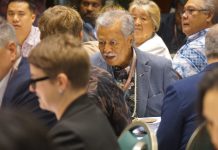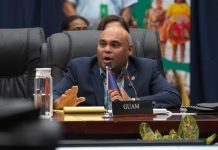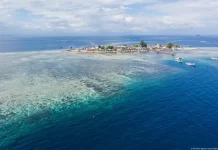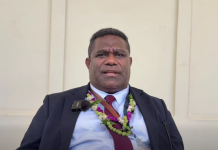Fisheries Ministers from member countries of the Pacific Islands Forum Fisheries Agency (FFA) have enhanced their commitment to address the impacts of climate change on oceanic fisheries.
This was made duringthe 20th Forum Fisheries Ministers meeting,which concluded last week in Majuro, Marshall Islands.
Fisheries Ministers welcomed the priority that the FFA is placing on work to respond to the impacts of climate change, and reiterated that climate change is the single greatest threat to the livelihoods, security and wellbeing of the peoples of the Pacific, particularly vulnerable Small Island Developing States and Territories.
As the Pacific Champion for Climate Change with a focus on Gender, Social Inclusion, Mitigation and Adaptation, Minister Mona Ainuu, Minister of Natural Resources of the Government of Niue lamented, “my heart cries every time I think of our people who experience the real threat of climate change.”
The centrality of the impact of climate change on fisheries was underlined by Minister Tingika Elikana of the Government of the Cook Islands who said, “The impacts of climate change remain at the forefront of our mind, and the impacts on our fisheries. The FFA must ensure that we have a robust strategy to guide actions to maintain and strengthen our food security, sovereignty and sovereign rights. Our people depend on this.”
Fisheries Ministers strongly supported the key work areas identified by the Secretariat for responding to climate change risks and impacts including climate justice, the securing of baselines and associated maritime boundaries in the face of sea-level rise, and the transition to adaptive management regimes that ensure tuna stocks are sustainably managed at levels that continue to contribute to the economies and food security of Pacific Island communities.
Fisheries Ministers also called for the impacts of climate change on ocean fisheries resources in the region to be raised internationally at the highest levels ensuring that fisheries issues are firmly placed onto the wider climate change agenda, including in the context of the Pacific’s engagement in the United Nations Framework Convention on Climate Change (UNFCCC).
Minister Charles Obichang of the Government of Palau said, “We need to continue to amplify our voice as Fisheries Ministers in calling for more global action to put 1.5 degrees within reach and to address future impacts of climate change in our fisheries. This voice will need to be amplified with our participation in global dialogues as well.”
Fisheries Ministers endorsed six high-level objectives to advance their commitment:
• Objective 1: Actioning Climate Change Adaptation and Resilience
• Objective 2: Achieving Climate Justice
• Objective 3: Accessing Climate Finance
• Objective 4: Contributing to Mitigation
• Objective 5: Capacity Building and Institutional Strengthening
• Objective 6: Advocacy and Engagement.
The high-level objectives will be elaborated in a climate change strategy for oceanic fisheries to be considered by Fisheries Ministers later this year.
The high-level objectives are built on priorities agreed by Fisheries Ministers in 2021 and 2022, in particular:’
a. The need for a coordinated regional approach to address climate change;
b. the need to build climate resilience on the collective fisheries;
c. the importance of strong governance systems to tackle climate change;
d. the importance of transitioning to adaptive fisheries management regimes;
e. the importance of cooperation with other CROP agencies to include fisheries in
the climate change negotiations;
f. the urgency for enhanced ambition and action to ensure ongoing sustainability of, and benefit flow to Pacific Island countries from, tuna fisheries in the face of climate change.
During the meeting, Minister Jelta Wong, Minister for Fisheries and Marine Resources of Papua New Guinea stressed that the negative impacts of climate change place a disproportionate burden on Pacific Island nations, and said, “The Pacific region is faced with an urgent need for viable reforms and climate action to effectively combat the devastating impacts of climate change.”
At the conclusion of the meeting, FFA Director General, Dr Manu Tupou-Roosen said, “We applaud the emphasis from our Fisheries Ministers to expedite the work on the Climate Change Strategy. This will bring together our current and future tasks and partnerships in this critical space. The Strategy will provide a valuable guide for Members and the Secretariat on how we prepare and respond to the risks and impacts of climate change on our oceanic fisheries.”.
SOURCE: FFA/PACNEWS















